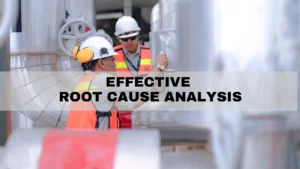What is Root Cause Analysis?
Defining a problem can be simple or it can become very complicated depending on what process you follow. We believe it is important to keep the root cause analysis simple for the frontline (planners, supervisors and hourly). So, what is root cause analysis?
Root cause analysis, commonly referred to as RCA, is the process of investigating failure of a product, process, or a piece of equipment. Most importantly is that you use the information to implement a change.
The work process for root cause analysis
The work process name can vary, but the basic components in the process are similar regardless of vendor, software, or consultant company. The components of any RCA investigation include:
The root cause trigger: The first part of the process is the trigger. A company typically decides on several triggers that initiates a root cause investigation should take place.
The Problem Statement: must state a factual observation to avoid misinterpretation. One should focus on a single object and one problem, enhancing the investigation’s clarity and effectiveness.
Collect Facts and Information: Information is gathered throughout the process. Its central to developing and verifying potential causes. Facts are essential not only for identifying causes but also for substantiating causal relationships in root cause investigations. An often-seen pitfall is the creation of cause-and-effect diagrams without proper verification, leading to unproven hypotheses rather than rigorous investigations.
Identify Possible Causes: Use creative thinking to come up with potential causes. Then compare each potential cause with the facts to establish verified causes. As a rule of thumb, it is good to list as many causes as possible in the first pass. But then start eliminating causes based on the evidence. It is very important to not disregard collected facts and information and go with “gut” feeling.
Select Most Likely Causes: Identifying the true causes to the problem is done by comparing cause-and-effect with convincing evidence to the relationship. All RCFA investigations have three levels of root causes: The Technical root cause (what physically happened), The human cause (someone did something, or missed doing something to trigger, the technical cause) and A systematic cause (the human did something because a work system wasn’t in place to direct or manage the human(s).
Identify Solutions: Identifying solutions to root causes may seem like a very basic step, but there are many factors to consider. First, make sure to use creative thinking in your solutions and have several alternatives, not only the first that comes to mind. Second, evaluate the proposed solutions in terms of cost, functionality, acceptance by the team etc. Typically, it is a good idea to propose the solutions with a cost-benefit analysis. Sometimes a solution just doesn’t make good financial sense.
Eliminate Root Causes: The hardest part of an RCA is to implement the identified solutions. The whole point of a root cause failure analysis investigation is NOT to identify the root causes, it is to eliminate root causes. Management should make sure there is a process in place to evaluate, select, and eliminate root causes from investigations. If you aren’t implementing the solutions, the RCA becomes a dusty report on a shelf or lost in a SharePoint folder.
Root Cause Analysis Training
Unfortunately, most RCA training classes focus on the documentation tool or software. It is common that 90% of the classroom time is spent on learning the software or how to use a diagram. Your time should be spent on learning how to solve problems. The documentation tool and software must be secondary in the teaching process.
IDCON’s Root Cause Analysis training is called Root Cause Problem Elimination. You’ll learn the skills to solve problems together more effectively.





